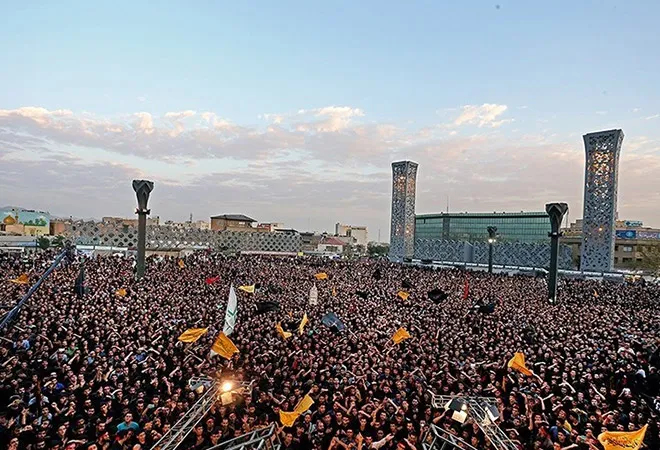-
CENTRES
Progammes & Centres
Location

Image Source: Wikimedia Commons
Demonstration in support of Iranian activity in Syria, Imam Hossein Square, Tehran
In the cauldron of conspiracy theories and cacophonic utterances that happen about Syria each day, with each unfolding day beginning on a deathly note, the local Syrian populace have assigned filters to ‘news’ and ‘threats’ issued locally and globally by all and sundry. Certain non-serious threats are assigned as dawda’ (noise) while the more serious ones are assigned as tahdid (threat).
So when the US conducts drills with rebel forces (Anti-Assad faction) in South-Eastern Syria last week, a majority of the Syrians dub it ‘dawda’(noise) with an irreverent fling of their hand.
A US military spokesman said the exercises were a show of force and that the Pentagon had notified Moscow through “deconfliction” channels to prevent “miscommunication or escalate tension”. This assertion on preventing of any ‘escalation’ is probably where the Syrians know the US limitation in entering the Syrian quagmire. And the subsequent assigning of the unflattering ‘noise’ epithet.
However, for a US exercises on Syrian soil, the Iranians are a worried lot. They should be. The exercises weren’t meant for the Syrians. The US outpost where these joint military exercises took place is Al-Tanf, which sits on the strategically significant Baghdad-Damascus highway.
 Source: Gulf News
Source: Gulf News
This highway was once a major supply route for Iranian weapons into Syria and US dominance on the Al-Tanf base makes it a bulwark against Iran and part of a larger campaign against Iran’s military expansion in the West Asia.
Not surprising that the control of this base has been a cherished goal of the Syrian government and its Russian and Iranian allies for a year now.
The US military’s new policy to bolster Tanf’s capabilities is a big shift. It signifies something deeper. That the US is narrowing down its West Asian objectives sharply -- to that of limiting Iranian influence.
Late last month, the US National Security Advisor, John Bolton, asserted that "we're going to see what we and others can agree in terms of resolving the conflict in Syria. But the one prerequisite there is the withdrawal of all Iranian forces”. Regime change and the stepping down of Assad is suddenly out of their earlier pre-requisite list.
Iran and Syria recently signed an agreement on defence and technical cooperation in Damascus. Iran’s Defence Minister said that the agreement "will define the areas of bilateral presence, participation, and cooperation in defence ties”, adding that Syria has put the era of war behind it and has entered the era of reconstruction. Clearly signifying a reduction in their active military presence in Syria, Iran might be looking at helping reconstruction and de-mining in the post-war effort.
In recent negotiations between Russia and the US, Russia’s Deputy Foreign Minister remarked that “Iran’s presence in Syria is at the invitation of the legitimate authorities, but there is room for work in this issue.” This telling statement, where Russia is dangling reducing Iranian influence as reconciliation to the US on the Syrian crisis is unprecedented.
But actually reducing Iranian presence against Iranian wishes will be quite the tight rope walk for Assad. Not only does Iran enjoy considerable goodwill in the Syrian Alwaite community (Assad’s support base), it’s Assad’s only all-weather friend in the burning neighbourhood. The Syrian civil war might be coming to a close, but the larger war is far from over. The Kurds, the Turks, the leftover factions of the ISIS and the Syrian free army are yet to reconcile within the mesh of rivalries. Iran is the one friend Syria needs in the West Asian vicinity.
The only hope for Assad is if Iran volunteers to reduce presence and limit influence to backchannels in Syria. Not because of Iranian geopolitical largesse but the state of the Iranian economy and more pressing needs internally. Also, the popular grain in Iran is against foreign intervention or investments into expensive military expeditions, when their own economy is in a downward spiral. Iran’s decision to stay put in Syria or give in to the elbowing might just make the difference. Temporarily at-least.
The views expressed above belong to the author(s). ORF research and analyses now available on Telegram! Click here to access our curated content — blogs, longforms and interviews.

Avijit Goel is a Senior Director with Flipkart. An alumnus of the Oxford University
Read More +